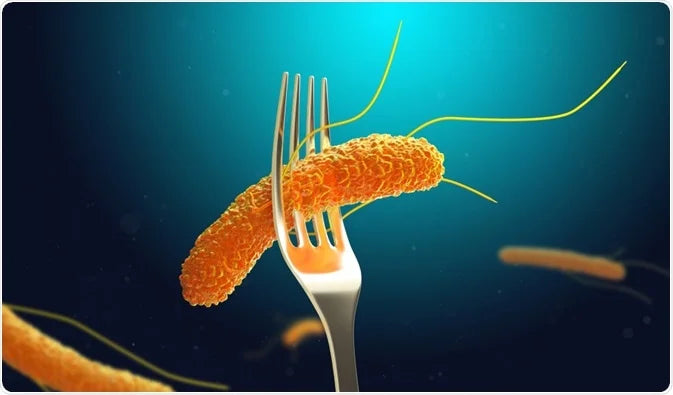- What Is Food Poisoning?
- Symptoms of Food Poisoning
- Causes of Food Poisoning
- What Causes Food Poisoning?
- Types of Food Poisoning
- How to Treat Food Poisoning
- Home Remedies for Food Poisoning
- Key Points For Preventing Food Poisoning
- Considerations To Be Taken For Food Poisoning
- Relief In A Cup: Namhya Foods Liver Cleanse Tea For Food Poisoning Symptoms
- Boost Your Immunity & Digestion with Namhyas Haritaki or Harad
Attention all foodies and adventurous eaters! Did you know that food poisoning affects approximately 48 million people globally annually? That's a whole lot of upset stomachs and unpleasant symptoms. Learn about the science behind the bacteria that cause it, warning signs to identify, and remedies to treat food poisoning naturally.
What Is Food Poisoning?
Food poisoning, also called foodborne illness, is a common problem affecting millions worldwide yearly. It is caused by consuming food or drink contaminated with harmful bacteria, viruses, parasites, or toxins. Food poisoning can result in many symptoms, ranging from mild discomfort to severe illness or even death.

Food poisoning can affect different organs in the body, depending on the type of infection and severity of the illness. However, the most commonly affected organs during food poisoning are the digestive system, liver, and kidneys.
Symptoms of Food Poisoning
Some common symptoms of food poisoning include:
- Nausea and vomiting
- Diarrhea
- Stomach cramps
- Fever
- Headache
- Fatigue
- Dehydration
Some potential complications of food poisoning include dehydration, kidney failure, neurological damage, sepsis, and in severe cases, death. Therefore, prompt medical attention is necessary if symptoms worsen or persist.
Causes of Food Poisoning
Several factors, including food contamination by harmful bacteria, viruses, and parasites, can cause food poisoning. These contaminants can enter our food through several routes, such as:
1. Poor hygiene: Food handlers who must wash their hands properly before handling food can spread harmful bacteria.
2. Contaminated water: Water contaminated with bacteria, viruses, or parasites can contaminate food during preparation.
3. Cross-contamination: When raw meat or poultry comes into contact with cooked or ready-to-eat food, it can transfer harmful bacteria to the other food.
4. Improper food storage: Food not stored at the right temperature can encourage the growth of harmful bacteria.
What Causes Food Poisoning?
Food poisoning is caused by:
- Bacterial contamination: Bacteria such as Salmonella, E. coli, and Listeria can contaminate food during production, processing, or handling. Improper food storage, inadequate cooking, and poor hygiene practices can also lead to bacterial contamination.
- Viral infections: Viruses such as Norovirus and hepatitis A can also cause food poisoning. These viruses can spread from person to person or contaminate food or water.
- Parasitic infections: Parasites such as Cryptosporidium, Giardia, and Toxoplasma can contaminate food or water and cause food poisoning.
- Toxins: Toxins produced by bacteria such as Staphylococcus aureus and Clostridium botulinum can cause food poisoning. These toxins are found in improperly stored or prepared food.
Types of Food Poisoning
What bacteria causes food poisoning? A different kind of bacteria, virus, or parasite causes food poisoning. Some common types of with signs of food poisoning include:
- Salmonella: This type of food poisoning bacteria is commonly found in raw poultry, eggs, & other types of meat. Symptoms can include diarrhea, fever, and abdominal cramps.

- E. coli: This type of food poisoning bacteria called Escherichia coli (E. coli) is found in undercooked beef, unpasteurized milk, and contaminated water. Symptoms can include severe diarrhea, abdominal pain, and vomiting.
- Listeriosis: This type of food poisoning is caused by a bacteria called Listeria monocytogenes, which is found in soft cheeses, deli meats, and smoked seafood. Symptoms can include fever, muscle aches, and gastrointestinal symptoms.
- Norovirus: This type of food poisoning is caused by a virus called Norovirus, which is often transmitted through contaminated food or water. Symptoms can include nausea, vomiting, and diarrhea.
- Campylobacter: This type of food poisoning bacteria is commonly found in raw/undercooked poultry, unpasteurized milk, and contaminated (polluted) water. Symptoms can include fever, diarrhea, and abdominal pain.
- Botulism: This type of food poisoning bacteria called Clostridium botulinum is found in improperly canned or preserved foods. Symptoms can include paralysis and difficulty breathing.
- Staphylococcus aureus: This type of food poisoning bacteria is found in food handled improperly or left at room temperature for too long. Symptoms can include nausea, vomiting, and diarrhea.
It's important to note that there are many other types of food poisoning, and the symptoms can vary depending on the specific pathogen involved.
How to Treat Food Poisoning
Food poisoning treatments require rapid medical intervention. Your doctor may recommend the following treatments:
- Rehydration: It's important to drink plenty of fluids to replace the fluids lost through diarrhea and vomiting. Water, electrolyte solutions, and clear broths are good options.
- Medications: Over-the-counter medications like anti-diarrheal drugs, anti-nausea medications, and pain relievers may be recommended to help manage the symptoms of food poisoning. However, talking to a healthcare professional before taking any medication is important, especially if you have underlying health conditions.
- Rest: Getting plenty of rest can help the body recover from food poisoning and prevent further complications.
Home Remedies for Food Poisoning
Food poisoning what to eat? Several home remedies can help alleviate the symptoms of food poisoning, including:

- Stay hydrated: Avoiding dehydration is a crucial step in overcoming food poisoning. Consuming water, clear broths, and electrolyte-rich liquids like coconut water or other drinks may help restore fluids and electrolytes lost during diarrhea and vomiting.
- BRAT diet: The BRAT diet stands for bananas, rice, applesauce, and toast. These foods are easy to digest and can help alleviate diarrhea and vomiting. Other bland foods that may be helpful include boiled potatoes, crackers, and chicken broth.
- Probiotics: Consuming foods high in probiotics, such as yogurt or kefir, can help replenish the good bacteria in your gut and may help reduce symptoms of food poisoning.
- Ginger: Ginger has been shown to help alleviate nausea and vomiting. You can try drinking ginger tea, eating ginger candies or chewing fresh ginger.
- Peppermint: Peppermint has been shown to have a calming effect on the digestive system and may help alleviate abdominal pain and discomfort. Drinking peppermint tea or taking peppermint oil supplements may be helpful.
- Chamomile: Chamomile tea has been shown to have anti-inflammatory properties and may help ease symptoms of food poisoning such as abdominal pain, cramps, and diarrhea.
- Harad: This herb also known as Terminalia chebula, has been used in traditional medicine for centuries to treat food poisoning. Its antibacterial and antimicrobial properties make it effective in fighting off harmful bacteria that cause food poisoning. Harad has also shown potential in treating bacterial, viral, and fungal infections.
It's important to note that while these home remedies may help alleviate the symptoms of food poisoning, they should not replace medical treatment.
Key Points For Preventing Food Poisoning
Preventing food poisoning is crucial as it can cause severe illness and even death in some cases. Fortunately, there are several steps you can take to prevent food poisoning. Here are some of the most effective ways to prevent food poisoning:
1. Practice good hygiene: Always wash your hands prior to handling food, after using the restroom, changing a diaper, and handling animals. Additionally, clean and sanitize any surfaces, utensils, or equipment that comes into contact with food.
2. Cook food thoroughly: Cooking food to the right temperature kills harmful bacteria and viruses that can cause food poisoning. Use a food thermometer to check that the internal temperature of the food has reached the appropriate level. For example, poultry should be cooked to an internal temperature of 165°F (74°C), while ground beef should be cooked to 160°F (71°C).
3. Store food properly: Make sure to store food in the appropriate temperature range. Perishable foods should be kept at 40°F or below in the refrigerator, and frozen foods should be kept at 0°F or below in the freezer. Additionally, make sure to follow the guidelines for storing different types of foods, such as separating raw meat from other foods, to prevent cross-contamination.

4. Avoid cross-contamination: Cross-contamination occurs when harmful bacteria are transferred from one food to another. To avoid cross-contamination, keep raw meat, poultry, and seafood separate from other foods during preparation and storage. Use different cutting boards, utensils, and plates for raw meat and other foods.
5. Be cautious when eating out: Ensure food is prepared and stored properly when eating at a restaurant or buying food from a street vendor. If you have any doubts about the safety of the food, it's best to avoid them.
6. Be careful with high-risk foods: Some foods carry a greater risk of causing food poisoning than others. These include raw or undercooked meat, poultry, seafood, unpasteurized dairy products, raw eggs, and raw sprouts. It's important to be extra cautious when handling these high-risk foods.
7. Practice safe food handling during travel: When traveling, make sure to practice safe food handling. Bring your own food or choose food carefully when eating out, and make sure to store and handle food properly.
Following these steps can significantly reduce your risk of getting food poisoning. Remember, prevention is key regarding food poisoning, so take the necessary precautions to keep yourself and your loved ones safe.
Considerations To Be Taken For Food Poisoning
1. Symptoms: Be aware of the common symptoms of food poisoning, such as stomach cramps, diarrhea, vomiting, and fever.
2. Time frame: Pay attention to the time frame between consuming the food and the onset of symptoms, as this can help identify the source of the contamination.
3. Severity of symptoms: Evaluate the severity of symptoms and seek medical attention if they are severe or persist for more than a few days.
4. Dehydration: Drink plenty of fluids to replace lost fluids and electrolytes, as dehydration can be a severe complication of food poisoning.
5. High-risk groups: Pregnant women, young children, the elderly, and people with weakened immune systems are at higher risk of complications from food poisoning.
6. Reporting: Report suspected cases of food poisoning to your local health department or regulatory agency to help prevent further contamination.
7. Prevention: Follow proper food safety practices, such as washing hands and surfaces regularly, cooking food to safe temperatures, storing food properly, avoiding cross-contamination, and seeking medical attention if necessary.
Relief In A Cup: Namhya Foods Liver Cleanse Tea For Food Poisoning Symptoms
Looking for a natural solution to help ease the discomfort of food poisoning or food poisoning symptoms? Try Namhya Foods Liver Cleanse Tea! This tea is specially formulated (with a unique blend of Ayurvedic herbs including harad, milk thistle, manjishtha, and pippali) to reduce inflammation, flush out toxins, promote good digestion to nourish the liver, and promote effective functioning.
Whether you're experiencing nausea, vomiting, or diarrhea, this liver cleanses tea can help soothe your digestive system and restore balance to your body. So why wait? Try Namhya Foods Liver Cleanse Tea today and feel the difference!
Say goodbye to stomach upset and hello to natural relief with Namhya Foods Liver Cleanse.
Boost Your Immunity & Digestion with Namhyas Haritaki or Harad
Namhyas Haritaki or Harad is a natural herb that has been used for centuries to treat food poisoning, boost immunity, and aid digestion. With its potent antibacterial, antimicrobial, and anti-inflammatory properties, Harad can effectively fight off harmful bacteria, reduce inflammation, and promote healing in the digestive system. It can also improve digestion, reduce the risk of infections, and strengthen the immune system.

For those looking for a natural solution to food poisoning, immunity, and digestion, Namhya's Haritaki is a safe and effective option. Try it today and experience the many benefits of this ancient herb.

